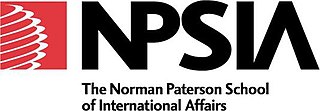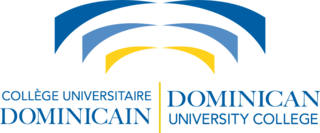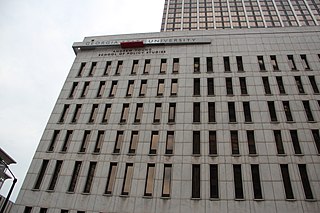
Carleton University is an English-language public research university in Ottawa, Ontario, Canada. Founded in 1942 as Carleton College, the institution originally operated as a private, non-denominational evening college to serve returning World War II veterans. Carleton was chartered as a university by the provincial government in 1952 through The Carleton University Act, which was then amended in 1957, giving the institution its current name. The university is named after the now-dissolved Carleton County, which included the city of Ottawa at the time the university was founded.

Algonquin College of Applied Arts and Technology is a publicly funded English-language college located in Ottawa, Ontario, Canada. The college has three campuses, all in Ontario: a primary campus located in Ottawa, and secondary campuses located in Perth and Pembroke. It offers bachelor's degrees, diplomas, and certificates in a range of disciplines and specialties. The college serves the National Capital Region and the outlying areas of Eastern Ontario, Western Quebec, and Upstate New York. It has been ranked among the Top 50 Research Colleges in Canada and has been recognized as one of Canada's top innovation leaders. The enabling legislation is the Ministry of Training, Colleges and Universities Act. It is a member of Polytechnics Canada.

The Norman Paterson School of International Affairs is a professional school of international affairs at Carleton University that was founded in 1965. The school is based at Richcraft Hall on Carleton's campus in Ottawa, Ontario, Canada. Students, alumni and faculty of NPSIA are referred to as 'NPSIAns'.
The Munk School of Global Affairs and Public Policy at the University of Toronto is an interdisciplinary academic centre. It offers various research and educational programs related to the field of globalization. It is located in Toronto, Ontario, offers master's degrees in global affairs and public policy, and a master's degree in European, Russian and Asia-Pacific studies. This school is a member of the Association of Professional Schools of International Affairs (APSIA). It also works in group of schools that educate students in international affairs. The Munk School's Master of Global Affairs program typically receives 500 and 600 applicants per year and offers 80 students entry into its program.

Arthur Kroeger, was a Canadian academic and civil servant, who was referred to as the "dean of deputy ministers".

The School of International Service (SIS) is American University's school of advanced international study, covering areas such as international politics, international communication, international development, international economics, peace and conflict resolution, international law and human rights, global environmental politics, and U.S. foreign policy.

The Dominican University College is a bilingual university located in Ottawa, Ontario, Canada. Since 2012, Dominican University College has been an affiliated college of Carleton University.

The School of International and Public Affairs (SIPA) is the international affairs and public policy school of Columbia University, a private Ivy League university located in Morningside Heights, Manhattan, New York City. SIPA offers Master of International Affairs (MIA) and Master of Public Administration (MPA) degrees in a range of fields, as well as the Executive MPA and PhD program in Sustainable Development.

The Gerald R. Ford School of Public Policy, also known as the Ford School, is the public policy school of the University of Michigan in Ann Arbor, Michigan. Founded in 1914 to train municipal administration experts, the school was named after University of Michigan alumus and former U.S. President Gerald Ford in 1999.

The Elliott School of International Affairs is the professional school of international relations, foreign policy, and international development of the George Washington University, in Washington, D.C. It is highly ranked in international affairs and is the largest school of international relations in the United States.

A public policy school or school of public affairs is typically a university program, institution, or professional school of public policy, public administration, political science, international relations, security studies, management, urban planning, urban studies, intelligence studies, global studies, emergency management, public affairs, nonprofit management, criminology, and the sociology of law.

The Office of Population Research (OPR) at Princeton University is the oldest population research center in the United States. Founded in 1936, the OPR is a leading demographic research and training center. Recent research activity has primarily focused on healthcare, social demography, urbanization, and migration. The OPR's research has been cited in numerous articles by the New York Times and the Wall Street Journal.

The Andrew Young School of Policy Studies at Georgia State University houses the Departments of Criminal Justice & Criminology, Economics, and Public Management & Policy, School of Social Work, and the Urban Studies Institute. Georgia State University is the largest university in the state of Georgia.

The Trachtenberg School, officially the Trachtenberg School of Public Policy and Public Administration (TSPPPA), is the graduate public policy school in the Columbian College of Arts and Sciences of the George Washington University, in Washington, D.C.

The Bush School of Government and Public Service is an undergraduate and graduate college of Texas A&M University founded in 1997 under former US President George H. W. Bush's philosophy that "public service is a noble calling." Since then, the Bush School has continued to reflect that notion in curriculum, research, and student experience and has become a leading international affairs, political science, and public affairs institution.

The Balsillie School of International Affairs (BSIA) is a centre for advanced research and teaching on global governance and international public policy, located in Waterloo, Ontario. As one of the largest social sciences initiatives in Canada, the school is a collaborative partnership between the University of Waterloo, Wilfrid Laurier University, and the Centre for International Governance Innovation. The BSIA is an affiliate member of the Association of Professional Schools of International Affairs, a group of schools that educate leaders in international affairs. The BSIA is housed in the north and west wings of the CIGI Campus. Admission to BSIA is highly selective.
The School of Public Policy and Administration at Carleton University (SPPA) is the public policy school of Carleton University in Ottawa, Ontario, Canada. Established in 1953, it is Canada's oldest graduate school in the field of policy studies and public management. Since its establishment, it has produced several prominent leaders within the Canadian public and non-profit sectors, and has led research activities in this area.
The Frederick S. Pardee School of Global Studies is the international relations and public policy school of Boston University. It was officially established in 2014 by consolidating and renaming a number of long-established programs in international and regional studies at Boston University dating back to 1953. The current dean of the Pardee School is Scott D. Taylor, an American scholar of African politics and political economy, with a particular focus on business-state relations, private sector development, governance, and political and economic reform. The Pardee School has nearly 1,000 students, including about 800 undergraduate students. It offers six graduate degrees, two graduate certificates, five undergraduate majors, and seven undergraduate minors, and also brings together seven centers and programs of regional and thematic studies.

John Nater is a Canadian politician. He is currently serving as the Member of Parliament for the riding of Perth Wellington in the House of Commons of Canada.
















